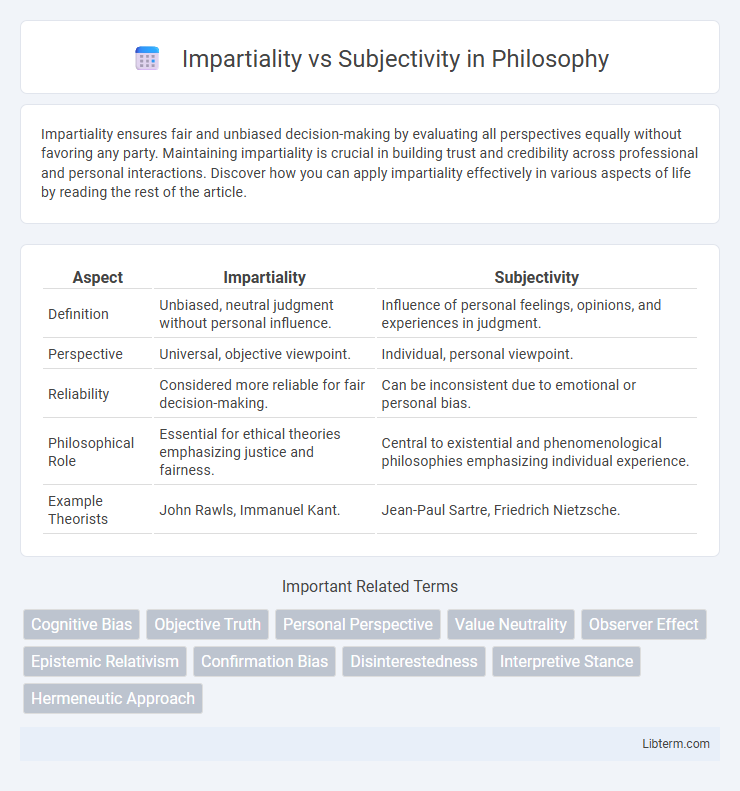Impartiality ensures fair and unbiased decision-making by evaluating all perspectives equally without favoring any party. Maintaining impartiality is crucial in building trust and credibility across professional and personal interactions. Discover how you can apply impartiality effectively in various aspects of life by reading the rest of the article.
Table of Comparison
| Aspect | Impartiality | Subjectivity |
|---|---|---|
| Definition | Unbiased, neutral judgment without personal influence. | Influence of personal feelings, opinions, and experiences in judgment. |
| Perspective | Universal, objective viewpoint. | Individual, personal viewpoint. |
| Reliability | Considered more reliable for fair decision-making. | Can be inconsistent due to emotional or personal bias. |
| Philosophical Role | Essential for ethical theories emphasizing justice and fairness. | Central to existential and phenomenological philosophies emphasizing individual experience. |
| Example Theorists | John Rawls, Immanuel Kant. | Jean-Paul Sartre, Friedrich Nietzsche. |
Understanding Impartiality and Subjectivity
Impartiality involves making decisions and forming judgments without personal bias or favoritism, relying solely on objective evidence and fair evaluation. Subjectivity, in contrast, reflects personal feelings, opinions, and experiences that influence individual perspectives and interpretations. Understanding impartiality and subjectivity is essential for distinguishing between objective analysis and personal influence in decision-making processes.
Historical Perspectives on Impartiality
Historical perspectives on impartiality emphasize its evolution as a fundamental principle in philosophy, law, and media, tracing back to classical Athens where democratic ideals demanded unbiased judgment. Enlightenment thinkers like John Locke and Immanuel Kant further shaped impartiality by advocating reason and fairness in governance and ethics. The transition from absolute monarchies to constitutional democracies reinforced impartiality as a cornerstone for justice and equal treatment under the law.
The Roots of Subjectivity in Human Experience
The roots of subjectivity in human experience stem from individual perceptions, emotions, and cognitive biases that shape personal interpretations of reality. Unlike impartiality, which requires objective evaluation free from personal influence, subjectivity is deeply influenced by cultural background, psychological states, and social context. Understanding these underlying factors reveals why humans naturally process information through a subjective lens, complicating efforts to achieve true impartiality.
Key Differences between Impartiality and Subjectivity
Impartiality involves unbiased judgment based on objective evidence and facts, ensuring fairness without personal influence or preferences. Subjectivity relies on personal feelings, opinions, and experiences, which can lead to partial or emotionally driven decisions. The key difference lies in impartiality's adherence to neutrality and fairness, while subjectivity reflects individual perspectives and biases.
The Role of Impartiality in Decision-Making
Impartiality in decision-making ensures fairness by evaluating information and circumstances without personal bias or emotional influence, leading to more objective and just outcomes. This approach enhances trust and credibility, especially in legal, organizational, and conflict resolution contexts. Subjectivity, influenced by personal feelings or opinions, can compromise the integrity of decisions, resulting in favoritism or unfair treatment.
How Subjectivity Shapes Personal Opinion
Subjectivity shapes personal opinion by filtering experiences through individual emotions, beliefs, and biases, which influence perception and judgment. This internal lens causes interpretations to vary widely between people, driven by personal history and cultural background. Unlike impartiality, which demands unbiased evaluation, subjectivity inherently embraces partial viewpoints tailored to each person's unique context.
Impartiality in Journalism and Media Ethics
Impartiality in journalism ensures that reporting remains unbiased, presenting facts without personal opinions or favoritism to maintain public trust and uphold media credibility. Media ethics demand that journalists avoid conflicts of interest, verify information through multiple sources, and provide balanced coverage to support democratic discourse. Adhering to impartiality prevents misinformation and polarization, fostering an informed audience capable of making reasoned decisions.
Navigating Subjectivity in Art and Literature
Navigating subjectivity in art and literature requires recognizing that personal experiences, cultural contexts, and emotional responses shape interpretation and meaning. Emphasizing diverse perspectives enriches understanding while mitigating biases inherent in purely subjective readings. Balancing impartial analysis with openness to individual viewpoints fosters a more nuanced appreciation of creative works.
Balancing Impartiality and Subjectivity in Everyday Life
Balancing impartiality and subjectivity in everyday life requires recognizing when personal biases influence decisions and striving to evaluate situations based on objective facts. Incorporating empathy and personal experience allows for nuanced understanding while maintaining fairness. Developing self-awareness and critical thinking skills enhances the ability to navigate between unbiased judgment and subjective insight effectively.
The Future of Impartiality and Subjectivity in Society
The future of impartiality and subjectivity in society hinges on balancing objective decision-making with personal perspectives to foster fairness and empathy. Advances in artificial intelligence and data analytics promise enhanced impartiality by minimizing human biases in critical areas such as justice, healthcare, and hiring. However, maintaining subjectivity remains essential for preserving cultural diversity and individual creativity within social and professional contexts.
Impartiality Infographic

 libterm.com
libterm.com